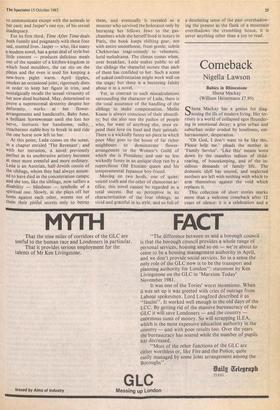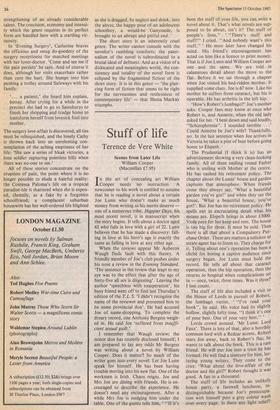Comeback
Nigella Lawson
Babies in Rhinestone Shena Mackay (William Heinemann £7.95)
Shena Mackay has a genius for diag- nosing the ills of modern living. Her ter- ritory is a world of collapsed egos flounder- ing in emotional decay; a grim urban and suburban order eroded by loneliness, em- barrassment, desperation.
'Oh God, I don't want to be like this. Please help me.' pleads the mother in 'Family Service'. 'Like this' means worn down by the ceaseless tedium of child- rearing, of housekeeping, and of the in- sidious demands of family life. The domestic idyll has soured, and neglected mothers are left with nothing with which to arm themselves against the void which replaces it.
This collection of short stories marks more than a welcome comeback after 12 years of silence: it is a celebration and a strengthening of an already considerable talent. The concision, economy and intensi- ty which the genre requires in its perfect form are handled here with a startling vir- tuosity.
In 'Evening Surgery', Catherine braves the officious and smug do-goodery of the surgery receptionist for snatched meetings with her lover-doctor. 'Come and see me if the pain persists' he says. And of course it does, although her visits exacerbate rather than cure the hurt. She bumps into him pushing a trolley around Safeways with his family:
a patient,' she heard him explain, betray. After crying for a while in the precinct she had to go to Sainsburys to finish her shopping and trudge home to transform herself from lovesick fool into mother.
The surgery love-affair is discovered, all ties must be relinquished, and the lonely Cathy is thrown back into an unrelenting con- templation of the aching emptiness of her life: 'She saw a series of bleak victories, a lone soldier capturing pointless hills when there was no-one to see.'
All of these stories concentrate on the eruption of pain, the point where it is no longer possible to elude a hateful reality: the Contessa Paloma's life on a tropical paradise-isle is shattered when she is expos- ed, clumsily, as a fake by a forgotten schoolfriend; a complacent suburban housewife has her well-ordered life blighted as she is dragged, by neglect and drink, into the abyss; the happy pose of an adolescent schoolboy, a would-be Ganymede, is brought to an abrupt and pitiful end.
The short story is an inherently cruel genre. The writer cannot console with the novelist's rambling comforts; the pater- nalism of the novel is subordinated to a brutal ideal of deftness. And as a vision of a dislocated and meaningless world, the con- sistency and totality of the novel form is eclipsed by the fragmented fiction of the short story. It is in this genre — 'the glan- cing form of fiction that seems to be right for the nervousness and restlessness of contemporary life' — that Shena Mackay triumphs.











































 Previous page
Previous page